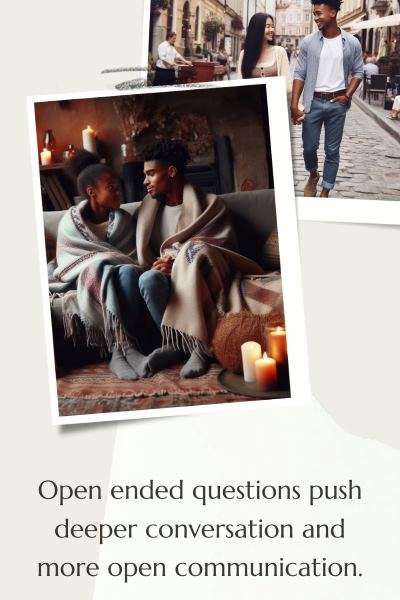Learn to deal with relationship conflicts in these 7 healthy ways
The single greatest key to navigating relationship conflicts in a healthy and constructive way is empathy.
Relationship conflicts are inevitable and can be a source of stress, frustration, and resentment, but they’re also an opportunity for growing your relationship deeper.
Empathy is the ability to put yourself in someone else’s shoes and understand their feelings, thoughts, and perspectives.
And in a relationship, empathy can help you communicate better, resolve disputes, and strengthen your bond with your partner.
Empathy has also been shown to help people become more generous, more forgiving and more resilient in relationships.
But how can you practice empathy in your relationship and use it to strengthen and grow each other?
Here are what I’ve dubbed the Seven Sails of Empathy and they can help you steer your relationship through stormy waters.
1. Listen actively
Active listening is the first sail of empathy.
It means paying full attention to what your partner is saying, without interrupting or judging and then engaging them so that they know you heard and understood what they were saying.
Active listening involves using verbal and non-verbal cues to show that you are interested and engaged.
These are as simple as eye contact when your partner is talking. Giving a nod or something so they can see you are still tracking on the conversation and then paraphrasing what they’ve said or asking questions about it.
Active listening can helps you better understand your partner and their wants and needs. It can also make your partner feel heard, respected, and valued.
2. Validate your partner’s emotions
Validating your partner’s emotions is the second sail of empathy and this simply means acknowledging and accepting your partner’s feelings, without minimizing or dismissing them.
Validating emotions involves using empathic statements to express that you care and understand, such as “honey I hate seeing you hurt like that” or “I know how hard that was and I’m proud of you for the way you got through it”.
The exact words don’t matter so much as expressing the fact that you can see whatever they are feeling and understand why.
When my wife first became ill it totally changed her world and the way she moves through it, and to help her I would try to look at what she was going through and put myself in her place for a moment and just think of how the situation would effect you.
For months she all of her nutrition came through a tube into her intestines, bypassing her stomach all together. And it hit her in different ways that I had to try and understand and appreciate how she was going through it.
Validating your partner’s emotions can help them feel more supported and uplifted, especially during stressful or hard times.
It can also reduce defensiveness, anger, and blame. In fact, research has shown that validating our partner’s emotions can enhance the emotional intimacy and trust in our relationship.

3. Ask open-ended questions
Asking your partner open-ended questions is the third sail of empathy and it means asking questions that invite your partner to share more information, their thoughts, and feelings in a deeper way.
It’s a simple way to develop more open and honest communication in your relationship.
Asking open-ended questions involves questions that start with words like “what”, “how”, “why”, or “tell me more” because these are the types of questions that can’t be answered with a simple yes or no.
And by asking for deeper answers, you show your partner that you truly care and want to know more about whatever it is you are discussing.
Asking open-ended questions can help you gain more insight into your partner’s situation or help see things from their perspective.
Ladies, these kinds of questions can also encourage your partner to open up, express themselves, and explore their emotions and we all know the trouble men can have with that.
4. Reframe the problem
The fourth sail of empathy is reframing the problem which means changing the way we look at or think about whatever problem is going on.
Essentially when it comes to a conflict, you have to try and turn looking at it from a win-lose situation into a win-win situation and that means looking for common ground, shared goals, and positive aspects of the situation.
How you reframe depends on the specific situation but it takes stepping back and consciously telling yourself that you are a couple and need to work together.
Remember that with each problem that arises, there is a real root cause that needs to be addressed and fighting each other only covers that root cause over more trauma and drama.
Reframing the problem can help you shift from a competitive or defensive sort of mindset to a collaborative one and helps to reduce overall relationship negativity, hostility, and resentment.
5. Express gratitude
Expressing gratitude is the fifth sail of empathy.
It means showing appreciation for your partner’s positive qualities, actions, and contributions to the relationship.
When you show your appreciation to your partner, it’s like filling up their hear and for men it drives us to do even better and be better for our partner.
Hearing my wife’s appreciation for something I’ve done for our relationship makes me want to double down and do even more, so ladies remember, you have a genuine power here to push your man to places you never though you would see him.
Expressing gratitude involves saying “thank you”, giving compliments, or doing something nice for your partner. I love when I get home from work and my wife comes up and just tells me how much she appreciates all I do for the family.
It makes a long work day worth it much more than some pay check.
Expressing gratitude can help you focus on the good things in your relationship, rather than the bad things. And that increases the overall happiness, satisfaction, and commitment in your relationship.
Research into gratitude and romantic relationships has found huge correlating factors between showing gratitude and building a strong and secure attachment to our partner.

6. Apologize sincerely
Apologizing sincerely is the sixth sail of empathy and it means admitting your mistakes and taking responsibility for your actions.
We all say sorry just to shut up the other person when we really feel like we were justified or had the right to do whatever wrong we did.
Apologizing sincerely though, involves saying “I’m sorry”, and then explaining what went wrong, what roles you had in it, and asking for their forgiveness.
You are going to have relationship disagreements, conflicts and even arguments. That’s natural and just a part of life, but how you and your partner handle them and treat each other during those times will determine if your relationship grows into a lifelong and happy marriage or not.
Apologizing sincerely can help you repair the damage caused by the conflict, restore trust and respect in your relationship, and prevent future conflicts from escalating because it stops the conflict and reopens our communication by taking down our defensive barriers we’ve put up.
7. Offer support
The final sail of empathy which will blow your relationship into calm waters is offering your partner support.
You have to be willing to give yourself emotionally to your partner when they need it and to do so means providing practical or emotional assistance to your partner.
And this is a daily thing. Offering support involves asking what they need from you, doing what you can to help them cope with the situation or solve the problem.
Offering real support to your partner can also help your partner feel less stressed, overwhelmed about the conflict. And it’s not always about overcoming some hardship, supporting your partner’s goals is just as important in building a great life together.
It can also strengthen your bond with your partner and show that you care about their well-being.
Set sail to a better relationship today
Empathy is a powerful tool that can help you navigate relationship conflicts in a healthy and constructive way.
When you start empathizing with each other, your relationship stops being 2 people living their lives together and starts becoming 2 people living 1 life together and building that life into something amazing.
By practicing these seven sails of empathy with your partner, you can turn conflicts into opportunities for growth, understanding, and connection.
Sign up for our free newsletter and get the latest articles, research, and great deals to keep your relationship growing.
You can find our latest articles below:
-

How the Presidential Election is Affecting Relationships
The election is just ramping up and with events like the attempted assassination, this election is affecting relationships like never before.
-

What to Do When Your Partner is Gaslighting in the Relationship
Gaslighting can make your relationship fall apart and bring your mental health with it. Here’s how to stop it before it starts.
-

How Men Gaslight Women in a Relationship
Gaslighting is something that can turn a good relationship into a living nightmare. Here’s how to recognize when it happens and what to do.
-

How Women Gaslight Men in a Relationship
Men, you need to be able to recognize when you are being gaslit by your woman. Here’s how and what to do about it to keep you safe and legal.
-

What is Gaslighting in a Relationship?
Gaslighting can turn a good relationship into a living hell, here’s what it is, and how to deal with it before the problems start.
-

Why Women Need to Start Approaching Men
Ladies you need to start approaching men and it is absolutely the #1 fastest way to catch that high quality man of your dreams.

4 responses to “7 Sails of Empathy that Blow Your Relationship Conflicts Away in a Healthy and Constructive Way ”
Great things to know and do them in a relationship. Thank you for sharing!
Thank you for taking time to comment. I’m glad you enjoyed it and yes if these are implemented into a relationship many of our conflicts will hopefully pass much easier. The main key is taking time in the heat of a conflict to step back and try to slow yourself down so that you can think of some of these other strategies. So often we get into a defensive mindset and go on the attack instead of truly trying to solve the problem.
These are great tips for getting rid of relationship conflict. I have been married for almost 7 years and we have gone through ups and downs.. many of them were solved by listening to how each other felt.
Thank you. And yes I completely agree that most conflicts can be solved by taking a moment to step back and just listen to each other.